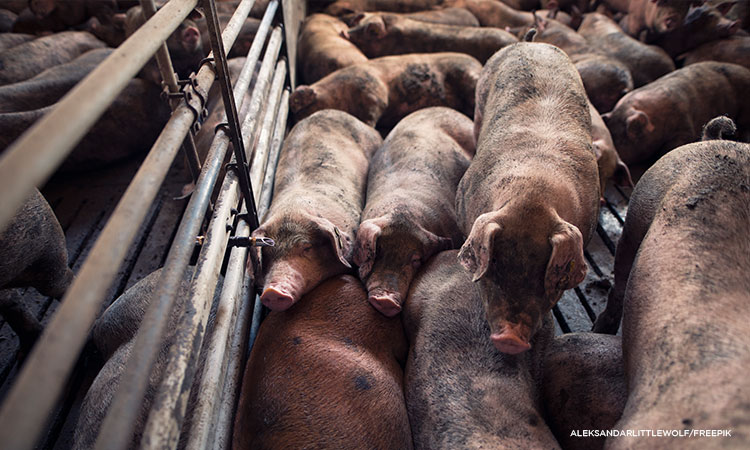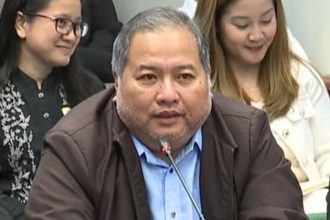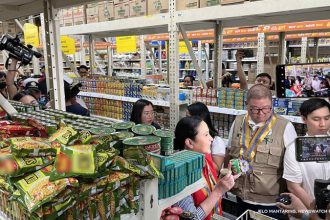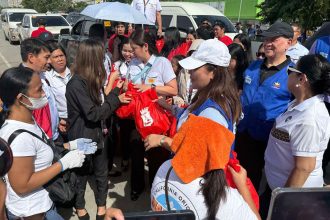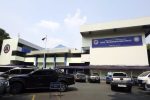
Metro Manila, Philippines — The Department of Agriculture is set to vaccinate grower pigs against the African Swine Fever (ASF) in Lobo, Batangas as the government rushes to contain the outbreak.
The DA began on Tuesday, Aug. 20, the orientation of producers in Lobo, which was reportedly “ground zero” for the outbreak. Town officials declared a state of calamity due to ASF on Aug. 6.
Agriculture spokesperson Arnel de Mesa told reporters that more than 160 hog raisers, mostly smallholders and with two commercial farms, attended the orientation led by the Bureau of Animal Industry and Lobo officials.
Blood testing has yet to start and the timeline was still unclear. Only swine that tested negative to ASF will undergo the vaccination program, which the DA said was voluntary.
De Mesa previously told reporters that it will take up to 48 hours to obtain results.
“‘Yung mga laboratory natin kailangan i-ready rin natin kasi biglang dadami ‘yung mga…blood samples na kukuhanin,” the DA official said in Tuesday’s interview. “Dapat ‘yung mga laboratory natin kagaya ng Regional Animal Disease Diagnostic Laboratory sa Lipa ay ready to accept and evaluate ito.”
[Translation: We must prepare our laboratories because there will be more blood samples. Laboratories like the Regional Animal Disease Diagnostic Laboratory in Lipa must be ready to accept and evaluate the samples.]
He added a monitoring period needs to be factored in for the vaccination rollout.
The DA made an emergency procurement of 10,000 doses of Vietnam’s AVAC ASF Live Vaccine as part of the controlled trial. The vaccines arrived on Monday and are expected to be deployed first to Batangas.
“It is not in the best interest of the government na i-delay ito kasi kailangan natin mag-repopulate,” Agriculture Secretary Francisco Tiu Laurel Jr. told reporters on Monday. “Bibilisan talaga, as soon as possible.”
[Translation: It is not in the best interest of the government to delay the vaccination because we need to repopulate hog farms. We will do this immediately, as soon as possible.]
The DA earlier said the indemnification for ASF-infected pigs has been raised to ₱4,000 for piglets, ₱8,000 for medium-sized hogs, and ₱12,000 for sows and bigger hogs. Previously, the maximum indemnification was ₱5,000 per pig.
ASF-infected pigs in checkpoints
Meanwhile, the DA confirmed on Tuesday that the 11 pigs seized on Saturday tested positive for ASF. Results came out on Sunday.
The DA reported on Sunday that authorities intercepted two trucks from checkpoints on Commonwealth, Quezon City, and Malanday, Valenzuela.
READ: BAI seizes pigs showing ASF signs
“The pigs were condemned and buried in a central burial site as part of the disease containment measures,” the DA said.
“Meantime, a total of 38 hogs, carried by another truck, tested negative for ASF. The BAI allowed them to be slaughtered immediately,” it added.
On Monday, Laurel wrote on Facebook that three trucks previously stopped at checkpoints in Quezon City, carrying a cumulative 161 pigs also tested positive for ASF.
The DA said it set up ASF checkpoints along Commonwealth; Mindanao Avenue, Tandang Sora, Quezon City; EDSA, Balintawak; Marulas, Valenzuela City; Malanday, Valenzuela; Animal Quarantine Checkpoint Brgy. Turbina, Calamba,Laguna; Star Tollway, Sto. Tomas, Batangas; and Alfonso Animal Quarantine Checkpoint, Brgy. Amuyong, Alfonso, Cavite.
“Patuloy na pinaparami ng DA-BAI ang checkpoints sa north at south NCR (National Capital Region) upang pigilan ang pagkalat ng ASF,” Laurel said. “Katuwang ng mga veterinarians at staff ng DA-BAI ang PNP (Philippine National Police) sa pagbabantay sa checkpoints.”
[Translation: The DA-BAI is continuously ramping up checkpoints in north and south NCR to stop the spread of ASF. The PNP is helping veterinarians and staff of DA-BAI in manning the checkpoints.]
As of Aug. 8, there were 251 barangays across 22 provinces in the country with active ASF cases, data from BAI showed. North Cotabato, Occidental Mindoro, and Batangas have the most number of affected barangays.




